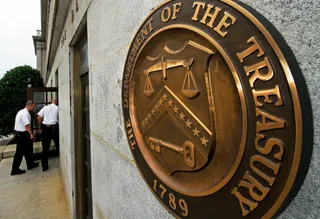Everything You Need to Know About the Debt Ceiling Crisis – Again
Frequently asked questions about the debt ceiling debate.

1 / 9
The Sky May Actually Fall - The United States is fast approaching the date when it will no longer have enough money to meet its financial obligations. According to most other lawmakers and economists, a default would not only cause significant harm to the U.S. economy, but could also trigger a global economic crash. Fitch, a major credit agency, has already put the government's credit on "Ratings Watch Negative." Here's what you need to know. – Joyce Jones (Photo: TIM MCCAIG/GettyImages)

2 / 9
What Is the Federal Debt Ceiling? - The debt ceiling is a cap on the amount of money that the United States can borrow. Like many Americans, the federal government spends more than it earns in tax revenues, which is why Congress has to frequently raise the limit so the nation can pay its bills. (Photo: Travel Images/UIG/GettyImages)

3 / 9
What Is the Current Debt Ceiling? - It is currently $16.7 trillion, but the limit was reached in May. Since then, the Treasury Department has taken "extraordinary measures" to continue paying the nation's bills. (Photo: Pete Marovich/Bloomberg via Getty Images)

4 / 9
Why Does the U.S. Even Need a Credit Limit? - A debt ceiling provides a gauge of how much the government is spending and aims to encourage lawmakers to keep it under control. Treasury borrows against the limit to pay the bills. (Photo: GettyImages)

5 / 9
How Many Times Has the Debt Ceiling Been Raised? - Since 1949, lawmakers have voted to raise the limit 79 times. (Photo: Andrew Burton/Getty Images)
ADVERTISEMENT

6 / 9
When Will the U.S. Reach the Debt Ceiling? - According to Treasury Secretary Jacob Lew, as of Oct. 17, his department will have exhausted all "extraordinary measures" to prevent a default. "There are no other legal and prudent options to extend the nation's borrowing authority," he wrote in a letter to Congress. (Photo: Mark Wilson/Getty Images)

7 / 9
What Will Happen If It Isn't Raised? - Treasury would not be able to borrow the money it needs to make up the difference between government spending and revenues. In addition, a default could cause another economic crisis that would undo the continuing recovery from the last one. (Photo: PAUL J. RICHARDS/AFP/Getty Images)
Photo By PAUL J. RICHARDS/AFP/Getty Images

8 / 9
How Would a Default Affect Me? - A default could cause layoffs by businesses unable to borrow money for payroll and other needs; credit markets could freeze and interest rates would soar. Safety nets like Social Security payments and food stamp assistance also could be at risk. (Photo: GettyImages)
Photo By Photo: GettyImages
